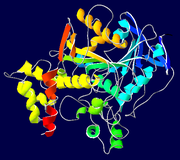
A cholinesterase inhibitor or anticholinesterase is a chemical that inhibits a cholinesterase enzyme from breaking down acetylcholine, so increasing both the level and duration of action of the neurotransmitter acetylcholine.
Contents |
Uses
Anticholinesterases occur naturally as venoms and poisons, are used as weapons in the form of nerve agents, and are used medicinally to treat diseases such as myasthenia gravis and Alzheimer's disease, and as an antidote to anticholinergic poisoning. In myasthenia gravis, they are used to increase neuromuscular transmission.
Examples
reversible inhibitor
Compounds which function as reversible competitive or noncompetitive inhibitors of cholinesterase are those most likely to have therapeutic uses. These include:
-
Organophosphates
- metrifonate
-
Carbamates
- physostigmine
neostigmine
pyridostigmine
ambenonium
demarcarium
rivastigmine
- physostigmine
-
Phenanthrine derivatives
- galantamine
-
Piperidines
- donepezil, also known as E2020
- Tacrine, also known as tetrahydroaminoacridine (THA')
- Edrophonium
quasi-irreversible inhibitor
Compounds which function as quasi-irreversible inhibitors of cholinesterase are those most likely to have use as chemical weapons or pesticides. These include:
- Organophosphates
-
Carbamates
- aldicarb
bendiocarb
bufencarb
carbaryl
carbendazim
carbetamide
carbofuran
chlorbufam
chloropropham
ethiofencarb
formetanate
methiocarb
methomyl
oxamyl
phenmedipham
pinmicarb
pirimicarb
propamocarb
propham
propoxur
- aldicarb
Effects
Some major effects of anticholinesterase:
Actions on the autonomic nervous system, that is parasympathetic nervous system will cause bradycardia, hypotension, hypersecretion, bronchoconstriction, GIT hypermotility, and decrease intraocular pressure.
Actions on the neuromuscular junction will result in prolonged muscle contraction.




 216.73.216.133
216.73.216.133 User Stats:
User Stats:
 Today: 0
Today: 0 Yesterday: 0
Yesterday: 0 This Month: 0
This Month: 0 This Year: 0
This Year: 0 Total Users: 117
Total Users: 117 New Members:
New Members:
 216.73.xxx.xxx
216.73.xxx.xxx
 Server Time:
Server Time:
